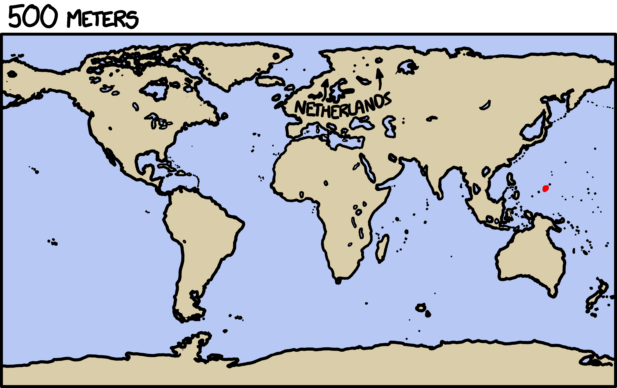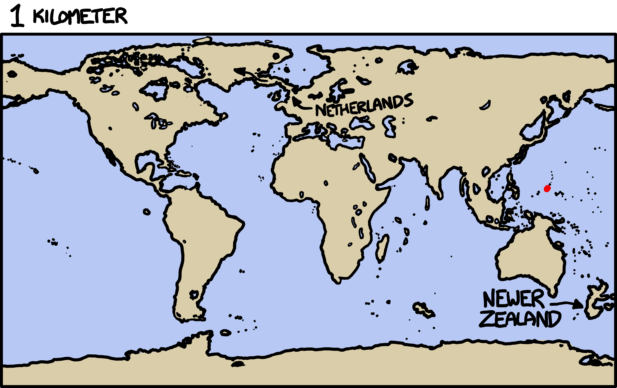So your question poses the situation of the world as it was in the 15th Century, plodding along, until in the blink of an eye, everything east of the Urals, the eastern shore of the Mediterranean, Black and Red Seas, and north of the Indian Ocean, is - poof - just gone. No land, no animals, no people, just a massive hole down to bedrock where Russia, China, Mongolia, India, the Arab world and Southeast Asia used to be.
First and foremost, the Egyptians, Greeks, Macedonians and southern Slavs are going to notice almost immediately that the land on the other size of the Gulf of Suez, the eastern Mediterranean, the Aegean and the Black Seas is gone, taking with it many of these cultures' close allies and deadly enemies. Egypt, by the 15th Century, was part of the Ottoman Empire which was very near its peak territorial claim, including most of the Islamic world west of Persia, as well as Greece, Bulgaria, Serbia, Crimea and a few other strongholds on the northern side of the Med in Europe. These settlements would find themselves suddenly and irreversibly cut off from their power center in modern-day northeast Turkey. North Africa by this time was largely settled by Suuni Arabs, who would also have lost their homeland in the Arabian Peninsula (including the holy shrines of Mecca and Medina). That would be offset, probably with very little celebration, of an end to the Sunni-Shi'ite divide that had made the Persians sworn deadly enemies of just about every other Muslim in the known world for nearly 500 years. The Greeks, already living under fairly brutal Turkish occupation at this time, would be looking across what used to be the Dardanelles, expecting to see modern-day Turkey including the other half of Constantinople, and instead, there's a massive hole in the earth filling with the Mediterranean and Black Seas (we'll get to that). So, geographically close civilizations to the borders of what we call Asia are going to see a difference pretty much immediately, and the most immediate effects would turn the Balkans and what's left of the Muslim world completely upside down.
Secondly, and somewhat less immediately but ultimately much more critically, if Asia's really just gone, the rest of the world is going to notice an immediate and very severe drop in sea level. How much? Depends on how deep this new ocean is.
As a very simple estimate, what geographers consider Asia proper, which includes the Arabian Peninsula, Turkey, the Levant and everything east of the Black Sea, is approximately 17.1 million square miles. The total surface area of all saltwater oceans and seas is about 139.4 million square miles. So by literally wiping Asia off the face of the Earth, you've increased the oceans' surface area by about 12% (yeah, only that much, from the world's largest continent; the oceans are big). Flip the fraction, and the world's oceans are about 8 times more surface area of the world than Asia.
So, if we have some fun with this, and posit that whomever or whatever removed Asia in the blink of an eye didn't think to replace the continent's subsurface volume with seawater, then by that same token, for every 8 feet deep your soon-to-be Asian Ocean is, the world's oceans get a foot lower. The average depth of the world's oceans is about 12,000 feet, so if we assume that the Asian continent is removed to that depth below sea level, the water required from the rest of the world's oceans would lower global sea levels by a whopping 1,500 feet.
In reality, it would be quite a bit more than that, because we're only thinking about the portion of the Asian continent that is above sea level now. If we also include the continental shelf region, which would include the relatively shallow South China Sea and shallow areas of the Indian, Pacific and Arctic Ocean, that's a lot more cubic miles of volume removed from the Eurasian Plate (and other smaller ones like the Yangtsze, Amur, Sunda, Indian and Arabian Plates) which would lower the ocean that much more. You could very easily drop global sea levels by half a mile or more.
This would be extremely noticeable to Middle Age Europe. Within a few hours of Asia's disappearance, one could walk from Calais to Portsmouth across what used to be the English Channel, making the British Isles a permanently-connected part of Norman territory. Within a couple of days, you could walk from Tunisia to Sicily and then to Italy without getting your feet wet, and a few more hours after sunrise, you could do the same across Corsica and Sardinia after the last little bit of deeper water drains. The Med is deceptively deep in places, 17,000' at its deepest in the Ionian Sea between Sicily and Greece, but quite a bit of it would be firm dry land within a week.
Further north, the Baltic Sea dividing continental Europe from Scandinavia is only 1,500' deep, and much shallower at the mouth of the sea between the Jutland and present-day Sweden. It's unlikely the Baltic would fully drain for this reason, as the northern Baltic deepens significantly, but it would be an inland salt sea, much like the deeper areas of the Mediterranean.
Randall Monroe did a What If on the topic of draining the ocean that would probably be of use. Let's see... Yes, here we are. Here's what the world would look like if the oceans were 500 meters lower (a little more than 1600', in the lower range of our predicted ocean level drop):

... and here's the world after a 1km drop in ocean levels (about 3200', the upper end of a back-of-the-envelope estimate for lost crust volume replaced by water):

(Source: Drain The Oceans - XKCD What If)
Basically, take these maps, and erase Asia.
The Nordic people would see massive gains in land area, offset by the fact that their fjords are dry. The British Isles would have stopped being islands 400m of drainage ago, and they, along with a lot of currently-underwater shelf to the south of the Channel, would be under a renewed Norman invasion (the British Fleet's defeat of the Spanish Armada wouldn't make the Brits a dominant world power for another 150 years or so).
The draining of the seas would happen pretty fast, as there would be a ridiculously large area of former Asian shoreline for the seas to drain into. I'd expect seafaring vessels in the Mediterranean and northern Scandinavia to be in for quite a ride east, one they very well may not survive. We are talking about a hole 12,000 feet deep where Asia used to be, after all, so sea floors above that level around the former Asian continent would turn into mile-high waterfalls.
Another slightly interesting thing will happen within hours of the continent's disappearance; as inrushing water, converging on all sides, meets in the middle of the former continent. As if a massive drain in ocean levels weren't enough, within a few hours, the leading edge of each bordering ocean or sea will collide in a fantastic fountain of seawater. A few hours after that, any coastal towns unlucky enough to have villagers exploring the dozens of miles of new beach created will get to experience a tidal wave of the backwash from this mid-sea collision, as the fountain settles back down to (rapidly-decreasing) sea level. So on top of the roughly billion people you just disappeared on the continent itself, add in another few thousand over-curious villagers washed into oblivion by the aftermath.
When everything calms down, there will be some lasting effects far beyond the creation of new land bridges in Europe and Australasia. Without Asia and the Middle East, Europe would not have picked itself back up out of the Dark Ages that consumed most of the first millenium AD and quite a bit of the second. To be fair, most of the developments borrowed from the Far East were a few centuries old in Europe by the Renaissance, however Renaissance Europe continued to benefit from trade and diplomacy with the Ottomans and points east through the Reformation years. It's very likely that this massive disruption in the world order could plunge Europe right back into the Dark Ages, as long-distance trade collapses (all the port cities now being several miles inland, and not all the water routes replace by land bridges), making the Renaissance a dim spot of light in what could end up being more than a millenium of stagnation of human progress in science and technology.
The New World wouldn't be colonized by the Spanish, as Spain's naval might would likely collapse fairly quickly in the 1400s with the loss of its existing ports after the Great Asian Disappearance, far earlier than the defeat of Philip's Spanish Armada by the British in 1588. The British would have some trouble too; no longer isolated by the English Channel and with most Southern English ports now landlocked, we'd very likely see the French and Germans both steamrolling the Brits in competing bids to control the newly-appeared land. The Nordic peoples would be in slightly better shape, especially Norway; their port facilities would be stranded high up in the mountains, but the Scandinavian fjords are natural deepwater ports. The Swedes' and Finns' ports are cut off from the North Sea and Atlantic by the new Jutland Land Bridge, but the Norwegians would be among the least affected, still able to travel to Greenland, Iceland and Nova Scotia. With English and Spanish exploration stymied, we really could be celebrating Eriksson Day instead of Columbus Day, as the Nordic explorers would have an extra hundred years or more to colonize present-day New England and Virginia. As long as they made a lasting peace with the Native Americans, and avoided smallpox (never endemic in Scandinavia, so Native Americans north of the Rio Grande weren't fully exposed to it until English colonization in the 17th Century), it's very likely continental Europeans would never take hold in the New World, and a combination of Native Americans and Nordic settlers would dominate modern-day North American civilization.


